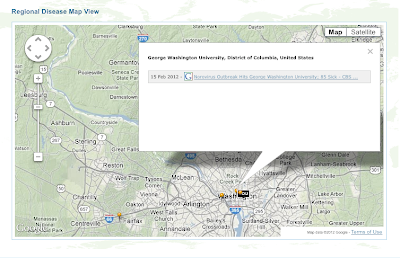Norovirus in the news
Wednesday, February 22, 2012
Add Comment
If you’ve listened to the news lately, you may have noticed people talking about norovirus, a bug that has sickened cruise-goers and college students around the country in recent months. If you’ve found yourself wondering, “What is norovirus, exactly?” we’re here to clear things up.
“Norovirus” is actually a group of viruses that affect the stomach and large intestines. People sickened by noroviruses often experience vomiting, diarrhea and stomach cramping. Sometimes the illness comes with other less-common symptoms, such as a low-grade fever, chills, muscle aches and tiredness. The symptoms usually begin suddenly and last for one to two days. It’s common for people to say that they have food poisoning or stomach flu, when really they’ve been sickened by a norovirus.
Noroviruses are spread through bodily fluids, such as vomit or feces of a sick person, or from surfaces that the sick person has touched. People living in close quarters — such as on a cruise ship or in a college dorm — are more likely to spread the illness, which is why we often hear about outbreaks on cruise ships and college campuses. Another way noroviruses are spread is through food that has been prepared by a sick person, which is why these infections are sometimes misnamed food poisoning.
Despite all the recent attention, noroviruses are not new. A recent study in the American Journal of Infection Control found that noroviruses are the leading cause of infectious disease outbreaks in hospitals, and the Centers for Disease Control and Prevention estimates that more than 50 percent of foodborne illness outbreaks in the U.S. are caused by viruses in this family.
If you are worried about protecting yourself against noroviruses, never fear! Here’s a list of things you can do to prevent their spread:
 |
| [Image: norovirus virons, courtesy CDC/Charles D. Humphrey.] |
Noroviruses are spread through bodily fluids, such as vomit or feces of a sick person, or from surfaces that the sick person has touched. People living in close quarters — such as on a cruise ship or in a college dorm — are more likely to spread the illness, which is why we often hear about outbreaks on cruise ships and college campuses. Another way noroviruses are spread is through food that has been prepared by a sick person, which is why these infections are sometimes misnamed food poisoning.
Despite all the recent attention, noroviruses are not new. A recent study in the American Journal of Infection Control found that noroviruses are the leading cause of infectious disease outbreaks in hospitals, and the Centers for Disease Control and Prevention estimates that more than 50 percent of foodborne illness outbreaks in the U.S. are caused by viruses in this family.
If you are worried about protecting yourself against noroviruses, never fear! Here’s a list of things you can do to prevent their spread:
- Proper hand-washing is the best thing you can do to prevent illness caused by noroviruses. Wash your hands every time you use the restroom and always before eating food. CDC has found some evidence that alcohol-based hand sanitizers alone are not effective in killing noroviruses, so be sure to wash with soap and water as well. If you need a refresher on the best hand-washing techniques, read our Get Ready fact sheet (PDF).
- Avoid close contact with someone who is sick. If someone around you develops symptoms of norovirus infection, don’t share eating utensils or cups, and don’t let the sick person prepare food for others for at least three days after they recover. Avoid touching your eyes, nose or mouth before washing your hands, and avoid shaking hands if there is an outbreak near you.
- Disinfect surfaces with a household cleaner that contains chlorine bleach, and be sure to machine-wash the sick person’s clothes, towels and sheets with hot water and dry on the highest heat setting.
 |
| [Image: Outbreaks Near Me screenshot courtesy HealthMap] |
0 Response to "Norovirus in the news"
Post a Comment